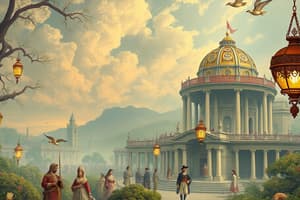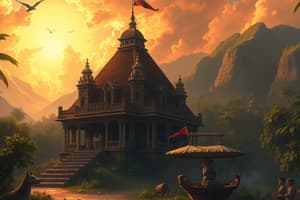Podcast
Questions and Answers
Who was Ferdinand Magellan?
Who was Ferdinand Magellan?
A Portuguese navigator in the service of the king of Spain.
The Spaniards occupied the Philippines for less than 300 years.
The Spaniards occupied the Philippines for less than 300 years.
False (B)
What is the function of a portolani?
What is the function of a portolani?
Charts that showed coastlines and distances between ports.
What is the Law of Burgos?
What is the Law of Burgos?
What were the '3 G’s' of Exploration?
What were the '3 G’s' of Exploration?
What was introduced in the Philippines with the coming of the Spanish colonizers?
What was introduced in the Philippines with the coming of the Spanish colonizers?
What was the social class of Filipinos educated in the late Spanish regime called?
What was the social class of Filipinos educated in the late Spanish regime called?
Which of the following were factors that contributed to the rise of the Chinese Mestizo?
Which of the following were factors that contributed to the rise of the Chinese Mestizo?
Inquilinos are similar to tenants.
Inquilinos are similar to tenants.
What worldview is founded on ideas of freedom and equality?
What worldview is founded on ideas of freedom and equality?
What led to more intensive rice cultivation and production of crops in the Philippines?
What led to more intensive rice cultivation and production of crops in the Philippines?
Flashcards are hidden until you start studying
Study Notes
Spanish Expeditions and Colonization
- Ferdinand Magellan, a Portuguese navigator, led the first expedition to discover the Philippines while seeking the Spice Islands.
- He proved the Earth's roundness and named the archipelago after King Philip of Spain.
- Motivations for exploration are encapsulated in the "3 G's": God (spreading Catholicism), Gold (economic trade), and Glory (exploring new territories).
Technologies of Exploration
- Portolani: Early navigation charts depicting coastlines and distances, limited for overseas use.
- Cartography: The science of mapmaking.
- Compass: Instrument for determining direction.
- Astrolabe: Used to calculate latitude based on the sun or stars.
- Lateen sails: Triangular sails enhancing maneuverability of ships.
Spanish Occupation
- The Philippines was under Spanish rule for over 333 years.
Labor Systems and Justifications
- Forced labor was common in Western Europe, enabling land ownership by Spaniards with rights over local indigenous populations.
- Justified through religious beliefs, claiming to fulfill God's will to convert natives.
- The Law of Burgos mandated education for indigenous children by encomenderos with substantial landholdings.
Social Classes in Colonial Society
- Viceroys: Appointed by the king, acted as heads of colonies.
- Peninsulares: Spaniards born in Spain, held exclusive rights to higher governmental positions such as viceroys.
Education
- Introduction of a European-style education system influenced by Spanish colonizers.
- King Philip II's “Laws of the Indies” aimed to educate Filipinos in reading and writing Spanish, although actual instruction was often inadequate.
- First schools established by missionaries; later, colleges equivalent to high school emerged.
- The Royal Decree of 1839 initiated a public school system, leading to the emergence of the "Ilustrados," a new educated social class.
- The opening of the Suez Canal facilitated faster travel to Europe, enabling locals to pursue education abroad, particularly in Barcelona and Madrid.
Rise of Chinese Mestizo
- Economic and political changes in Europe began influencing Spain and the Philippines, leading to commercial agricultural development.
- The emergence of a new class: Chinese Mestizos, who gained influence and wealth through enterprise.
- Economic progress in the 19th century fostered a new middle class in the Philippines.
Rise of the Inquilinos
- Inquilinos, meaning “tenants,” emerged following the elimination of the Galleon Trade and the opening of the Suez Canal.
- They engaged in intensive rice cultivation, paying fixed rents based on land quality and size.
- Increased land consolidation led to conflicts over divisions of communal land and resource access, creating tensions between estate owners and workers.
Political Landscape
- Liberalism as a political ideology emphasizes freedom, equality, and the protection of individual rights against government abuse.
- The French Revolution (1789-1799) promoted principles of liberty, equality, and fraternity, influencing political changes and anti-clerical sentiments in Europe.
- Political reforms and changes in governance during this period impacted global perspectives and structures.
Studying That Suits You
Use AI to generate personalized quizzes and flashcards to suit your learning preferences.




